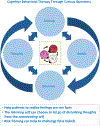Addressing Anxiety and Depression in the Allergy Clinic Through Motivational Interviewing, Brief Cognitive Behavioral Therapy, and Curious Questions
- PMID: 40383432
- PMCID: PMC12285741
- DOI: 10.1016/j.jaip.2025.05.020
Addressing Anxiety and Depression in the Allergy Clinic Through Motivational Interviewing, Brief Cognitive Behavioral Therapy, and Curious Questions
Abstract
Allergic diseases, particularly food allergy, can be associated with significant psychosocial impairment. Allergist-immunologists can provide evidence-based information to correct misperceptions and misunderstandings regarding food allergy that may perpetuate cycles of fear and anxiety. Whereas motivational interviewing can be an empathetic approach to empower patients to actualize health goals, cognitive behavioral therapy (CBT) aims to provide disease-state insight to facilitate an understanding of risk that can transform health beliefs and behaviors. Brief CBT is a clinical approach that can help address ineffective management paradigms through conversations that begin with curious questions. In this review, we discuss evidence supporting implementation of an integrated method of CBT in the Allergy-Immunology clinic and provide resources for this approach.
Keywords: Allergic diseases; Allergic rhinitis; Anxiety; Asthma; Cognitive behavioral therapy; Empowerment; Food allergy; Mental health.
Copyright © 2025 American Academy of Allergy, Asthma & Immunology. Published by Elsevier Inc. All rights reserved.
Conflict of interest statement
No funding has been received for this study.
Figures


References
-
- Conway AE, Verdi M, Kartha N, Maddukuri C, Anagnostou A, Abrams EM, et al. Allergic diseases and mental health. J Allergy Clin Immunol Pract 2024; 12:2298–309. - PubMed
-
- Gupta E, Conway AE, Verdi M, Groetch M, Anagnostou A, Abrams EM, et al. Food allergy, nutrition, psychology, and health. J Allergy Clin Immunol Pract 2025;13:773–82.e2. - PubMed
-
- Stukus DR. Tackling medical misinformation in allergy and immunology practice. Expert Rev Clin Immunol 2022;18:995–6. - PubMed
-
- Stukus DR. How communication of evidence and translation into practice has evolved over the past 80 years. Ann Allergy Asthma Immunol 2023;131:126–7. - PubMed
Publication types
MeSH terms
Grants and funding
LinkOut - more resources
Full Text Sources
Medical

